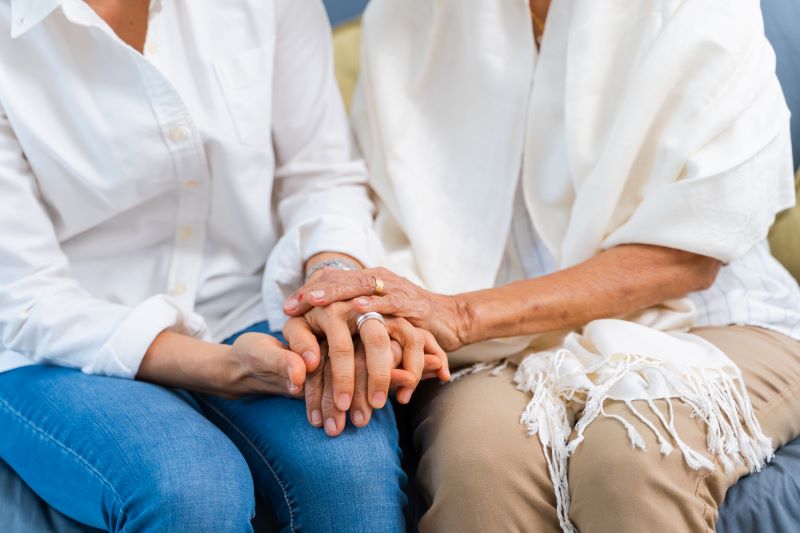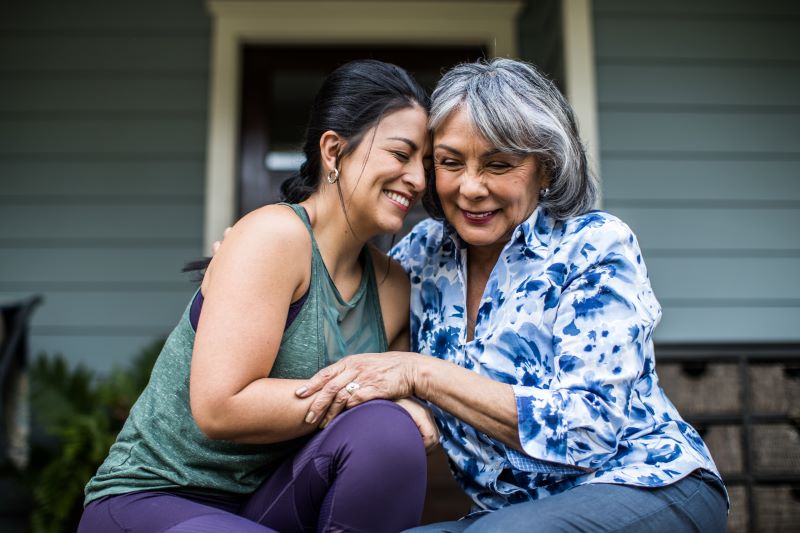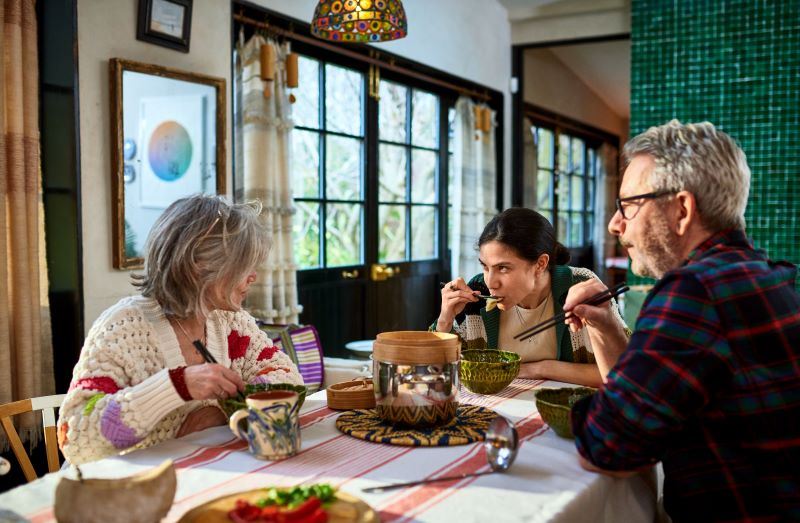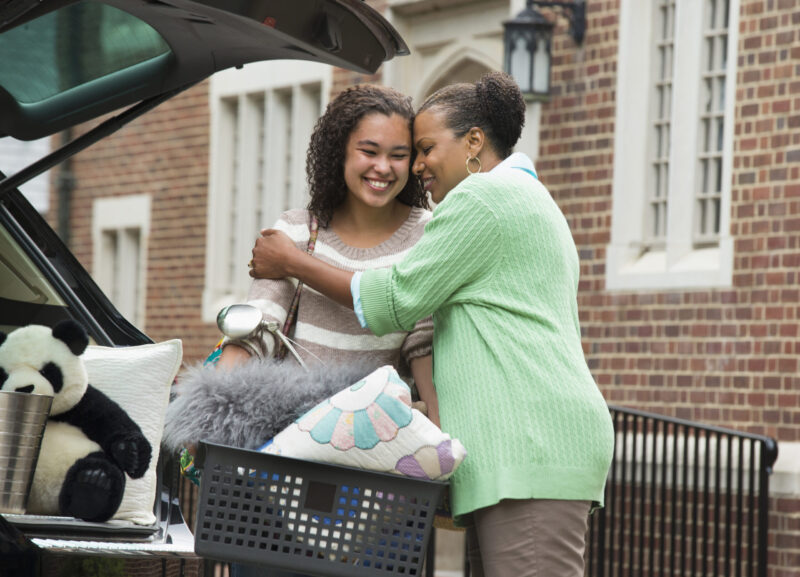The idea of the mothers portrayed in 1960s movies and art is as outdated as many other attitudes of that era. Today’s moms shape their own ideas of motherhood—whether they have kids when they’re young, or later, when they hold a score of life lessons under their belts.
Read on to hear four women’s experiences as moms. Each shares what she learned and how her children benefit from their parenting styles.
Children are a mirror
Kimberly Best, 63, raised three generations of children, including two daughters and three sons. Today they range in age from 22 to 43 years old. “I used to say I had 41 straight years of parenting, without parole,” says Kimberly, a conflict manager in Brentwood, Tenn.
Over the years, she’s learned much about herself from her children, she says.
“They hold up a mirror, reflecting back to us how we are, and it’s not always pretty,” says Kimberly, who was a single mom for much of her kids’ childhoods. She remembers a time when she walked out of the room during a difficult conversation with her then 16-year-old son. “And you call yourself a conflict manager,” he called out after her.
“He knows you’re not supposed to turn around and walk away [during a hard conversation],” Kimberly says. “It reminded me how hard it is when it’s our own conflict.” As her kids grew older, it wasn’t easy to give them the freedom to make choices that she worried wouldn’t go as planned.
Sometimes, Kimberly went against others’ advice, like when a kindergarten teacher at her twins’ school told her homeschooling her twins would be a mistake. Instead, the opposite was true. In addition to their studies, Kimberly took her son and daughter to museums, toured the local newspaper’s headquarters and went to summer educational camps.
“I didn’t keep them at home,” says Kimberly. Instead, they got a lot of information and experience to sample, and they got it from experts, she says.
Now that her children are adults, they understand the value of all Kimberly juggled as a single, working mom. One of her sons, who is now married with kids of his own, recently told Kimberly that he can’t imagine doing it all as a single parent.
“I knew my kids wouldn’t understand what I was doing until they were parents themselves,” says Kimberly. Now, her kids often come to her for parenting or life advice. “Every single one of them will call me if they get stuck. I feel like that’s the biggest honor in the world.”
Baby in the board room
Renee Fry, the CEO of an estate planning company, was in for a surprise when she picked up her 8-year-old son from band class four years ago.
“Tell my teacher you sell wills,” her son Liam said when he got in the car.
Liam, who accompanied his mom to work events since he was a toddler, made his teacher uneasy when he told him he should get a will. “It’s really easy. You can even get them online,” Liam’s friend chimed in.
Renee rushed inside and told the teacher that Liam learned about wills from coming to her work events. “He’d never met two third graders so intent on making sure his final wishes were protected,” says Renee, 52, who lives with her husband and sister in Boston. She attributes Liam’s natural sales ability to bringing him to work and business events most of his life—something she was confident doing as an older parent.
“I would bring my 9-month-old child to visit with venture capitalists because the babysitter canceled,” Renee says. “I wouldn’t have had the confidence, acumen or experience to do that when I was younger. But as you age and people know you’re a leader, you can create those opportunities for your children as well. Luckily, my son enjoys that.”
Renee leans toward thinking more rationally, but says that in motherhood she’s also more in touch with her emotional side, making sure she says ‘I love you’ and giving hugs when her husband and Liam need them.
“That’s something I’ve worked on,” Renee says. “As a mother, I have to understand what my child needs. That may not be your strongest suit, but it might be something your child needs, and you need to be able to grow like that.”

Teaching them to adult
For Mona Andrei, 59, Preparing her children for adulthood played a huge part in her parenting style. Mona is a Montreal-based humor blogger and the author of “Superwoman: A Funny and Reflective Look at Single Motherhood.” Her four children range in age from 24 to 38 years old.
“When they’re young, it’s all about making sure that your children eat well, they’re dry, and they feel safe and loved,” says Mona, who’s been a single mom for much of her kids’ lives. “As they get older, it’s also about carrying them through the world and teaching them by example how to be kind, considerate human beings.”
In a world filled with distractions, Mona taught her kids the importance of focusing, whether it was on homework or a conversation with friends. Phones at the dinner table were never allowed; Mona and her kids often had picnics on the living room floor, sipping milk from wine glasses on family movie night.
“I told them we’re not answering the phone,” Mona says. “Our special time is right here, right now. I taught them that life doesn’t revolve around them, but it’s also okay to set boundaries. I taught them how to adult.”
Mona couldn’t always afford everything her kids wanted. One daughter used to get upset because she couldn’t have the trendy (and expensive) clothes and shoes her friends wore. Now that her daughter is an adult living on her own, she understands how difficult it can be to make ends meet, especially while supporting kids on a single salary.
“Now that my children are adults with lives of their own, I can reflect back and see how some of my teachings and values have benefited them,” Mona says. “It makes me proud to say my adult children are kind towards others, self-aware and ambitious, each in their own way.”
Fostering a legacy
One of Nina Perez’s most treasured memories is how excited her son Gavin used to get at 2 months old when it was time to nurse. “I’ll never forget his face of complete satisfaction, bliss and happiness when he was done,” says Nina, a 43-year-old connection coach in Vancouver, Canada, who teaches body language and communication skills.
“He would then flutter his eyes and end up falling asleep. I felt such peace knowing he was happy, I was taking care of him to the best of my ability and we were okay.”
As a single mom, it was important to have those small moments of success and security, Nina says. Today, Nina and 11-year-old Gavin live with her husband and stepdaughter Jasmin—also 11—in Vancouver.
“[Jasmin] gets to have her mom and me as well, so that’s a bonus,” Nina says. “Same for my son, as he gets his dad and a bonus dad with his stepfather, Brent.”
Motherhood has changed Nina’s life in every way, she says.
“Before motherhood, I felt I had all the time in the world, and there wasn’t that much urgency to certain goals or life experiences,” Nina says. “Since I’ve become a mother, it’s like a fire was lit inside of me to be the best version of myself.”
Being a mom also changed how Nina views the world: “I think about legacy. I think about the generations after me, the children of my children and their children,” Nina says. “My kids see my attempts, my failures and wins, and they learn more from that than what I say or teach.”
When other parents tell her “your son said he liked my haircut,” or “your daughter stayed to help me clean up the birthday cake plates,” Nina knows she’s planting seeds of kindness in her kids—and hopefully for generations to come.
“These moments make me feel proud of the kinds of people my children are becoming,” says Nina. “It makes the ups and downs of motherhood worth it.”
Share your own reflections on motherhood in the comments!







My favorite part of Mothers Day use to be my two sons; that are now 43 and 40. But now it’s them and my 2 grandkids… Just to spend the day with them…